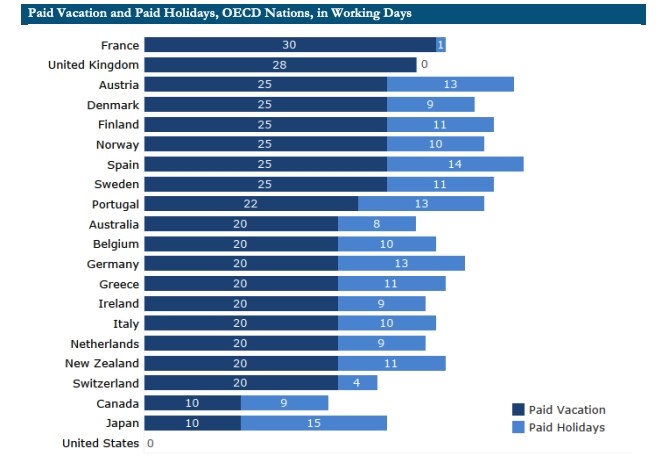
Image Credit: FILE PHOTO
June 01, 2020 - 7:00 AM
When New Zealand Prime Minister Jacinda Adern publicly encouraged employers to move to a four-day work week, it got quick uptake here in Canada.
Adern suggested if Kiwis had more downtime, they could reignite the domestic tourism market by spending their vacations within the country. While Prime Minister Justin Trudeau seemed lukewarm to the idea for now, B.C. Green Party MLA Sonia Furstenau put forward the idea of a four-day week in a pitch to become the leader of the party.
Canadians seem to like the idea. An Angus Reid Institute survey in 2018 found that 68 per cent of Canadians would rather work forty hours in four days, over the status quo, up significantly from 1981 when only 43 per cent said yes to the proposition.
But the idea has also stoked another question that few Canadians seem aware of and fewer national organizations pay much attention to: Why not give Canadians the same holidays enjoyed by the rest of the industrialized world?
Canadians seem largely unaware but when it comes to paid vacation time, the country is at the bottom of the barrel.
Canada comes second to last out of 22 western nations for paid vacation time. By law, Canadians get two weeks paid vacation - with the exception of Saskatchewan which gets three. Most other industrialized nations, including Australia, New Zealand, Greece and Ireland, get a minimum of 20 paid vacation days a year or more. Scandinavians get five weeks and the French top the list with 30 paid vacation days.
These paid vacation days are also separate from statutory holidays, typically around 10 days off a year.
Henry Goldbeck, president and CEO of Goldbeck Recruiting, is well acquainted with the market as a head hunter for corporate clients.
"We are behind the rest of the world," he told iNFOnews.ca "In Canada, what we noticed in the market here is that everyone's used to it."
Goldbeck said a junior accountant or a mid-level manager will probably score three weeks holidays and more senior roles for those making $150,000 to $200,000 may start off with four weeks — roughly on par with those working minimum wage in Hamburg or Melbourne.
So why, when the standard of living in Canada in many other aspects trumps many other westernized nations, do we lag so far behind when it comes to vacations? Economist Glika Ivanova says most Canadians simply aren’t aware of standards in countries not in North America.
"We haven't had the conversation," she says. "And I absolutely think talking about vacation entitlement is an important conversation that needs to happen."
As a senior economist at the Canadian Centre for Policy Alternatives, Ivanova says the subject just isn't on the radar.
"I can only speculate and my only guess is that our closest neighbouring country is the United States and they are even worse (off)," she says.
A report from the Centre for Economic and Policy Research states the U.S. is the only advanced economy that does not guarantee its workers any paid vacation.

A graph of vacation leave from the 'No-Vacation Nation' paper by the Centre for Economic and Policy Research
Image Credit: Centre for Economic and Policy Research
Ivanova says Canadians don't do enough international comparison and often only look to what's happening in the U.S.
Even in her left-leaning policy research institute, Ivanova says they've only touched on vacation days and pay "modestly" as a minor recommendation in a paper to extend paid vacation to four weeks after 10 years of employment. She seemed almost embarrassed her organization hasn't worked on it.
However, it's not just policy economists who haven't broached the subject.
The B.C. Federation of Labour couldn't provide comment on the subject even though the media spokesperson said they'd "hunted high and low" in the organization for someone to speak on the matter.
Tracking down an academic didn't net any results either. A UBC media spokesperson said every professor they approached said it was outside their area of expertise.
The industry that would no doubt benefit the most if Canadians had another 10 days off work and few international destinations to spend them, had nothing to say about either increased vacation days or a four-day work week.
A spokesperson for Tourism Kelowna said the issue of more vacation time wasn't "a good fit" with the direction of their current messaging and refused to comment further. The Thompson Okanagan Tourism Association didn’t respond to numerous emails.
When we asked UBC, the media spokesperson said they had no idea Canada fared so badly when it came to vacation time. A staffer at the Ministry of Labour said no reporter had ever asked the question before.
Those hoping the union-friendly B.C. NDP government may be addressing the issue will be sadly let down.
"There are no current plans to increase the number of vacation days for workers in B.C.," Labour Minister Harry Bains said in a statement.
While most British Columbians aren't talking about their lagging holidays, others are.
"You get the lifestyle," former U.K. resident Amanda Watson says. "But crap holiday pay."
The Vernon resident got 33 days paid holiday working as an engineer for a local government in the U.K. before she moved to Canada 12 years ago. Her first job here garnered her 10 days vacation.
"The next year I got 15 days and I now stand at a whopping 25," she says.
Watson said paid vacation was certainly a factor in deciding to immigrate to Canada. Turn to any online forum about moving to Canada and it's the one factor that makes people apprehensive about moving here.
"How do people manage? Living in a beautiful country, how do you find time to explore, take up hobbies, visit your home country?" asks one U.K. resident.
Another U.K. doctor thinking about moving here asks whether the two-week vacation rule is actually true.
"It just seems to be such a small amount of time off compared to the five weeks I currently get here. Do Canadians take extra unpaid holiday time, or do some companies give more paid annual leave than that? I don't know if we could cope with only two weeks off a year," reads the post.
As the manager of transportation for the City of Vernon, Watson's senior position nets her more holiday pay than most, but that’s hard to compare. We couldn’t find any statistics showing how many vacation days the average Canadian worker gets.
The lack of those statistics might help explain why there isn't a bigger outcry.
"It is shocking that we in Canada have two weeks and everybody else in the world, in developed countries has four weeks," Ivanova says. "We haven't exactly been pushing very hard... the Family Day holiday introduced in 2013 was a big deal."
Not everyone is on board with more vacation time and pay. The Fraser Institute opposed the Family Day statutory holiday when it was introduced. The right-wing think tank said it would cost B.C. families and taxpayers millions of dollars.
So could the B.C. and Canadian economy support more holiday pay?
"Having more time that people can spend off work in their local communities would be very helpful to the economy right now," Ivanova says. "Everyone getting two weeks time off we'll need working to fill the gap, that might be a way to boost employment... it can potentially get more people into jobs."
So can businesses afford it?
"Obviously if businesses in New Zealand, Australia, Germany and all these other countries... are able to function with paid vacation, clearly it can be done," Ivanova says.
As for the four-day working week, Goldbeck points to changes made during the pandemic. All his staff are now working at home and they've just started closing down early on Fridays.
"Every time the minimum wage comes up there's a great outcry and it was expected and economically propagated by the business community that it would be horrible for the community and destroy jobs," Goldbeck says. "And we're starting to see that that's not necessarily the case, so maybe it will be the same thing with the four day work week, it's not the end of the world."
To contact a reporter for this story, email Ben Bulmer or call (250) 309-5230 or email the editor. You can also submit photos, videos or news tips to the newsroom and be entered to win a monthly prize draw.
We welcome your comments and opinions on our stories but play nice. We won't censor or delete comments unless they contain off-topic statements or links, unnecessary vulgarity, false facts, spam or obviously fake profiles. If you have any concerns about what you see in comments, email the editor in the link above.
News from © iNFOnews, 2020